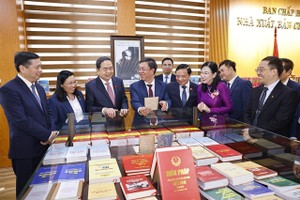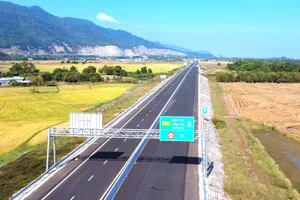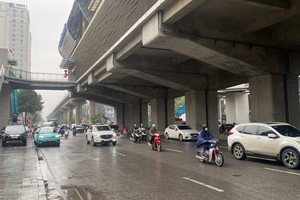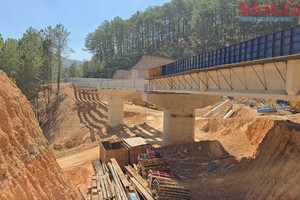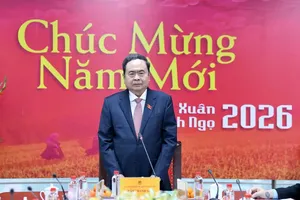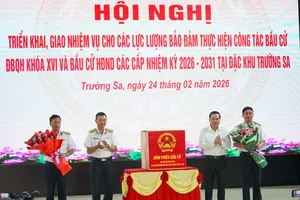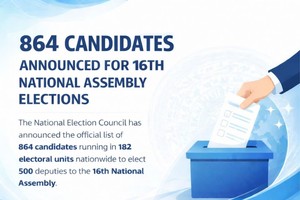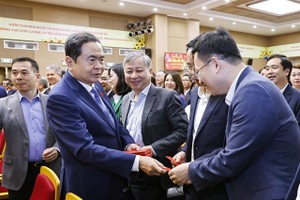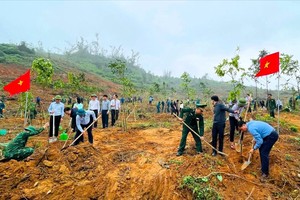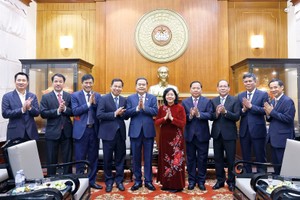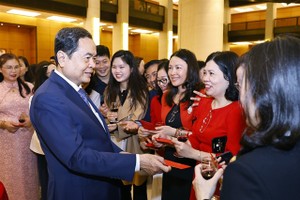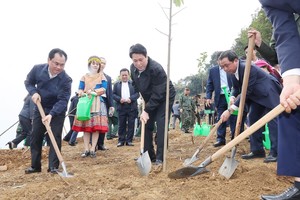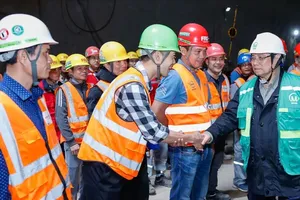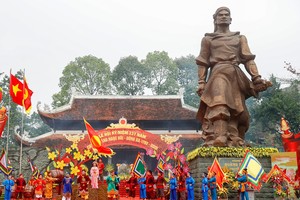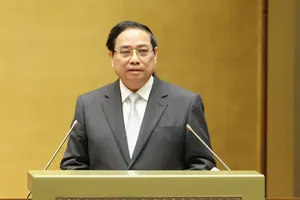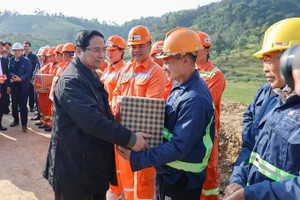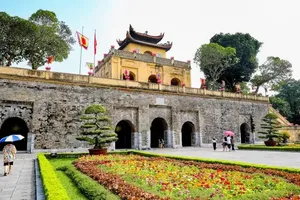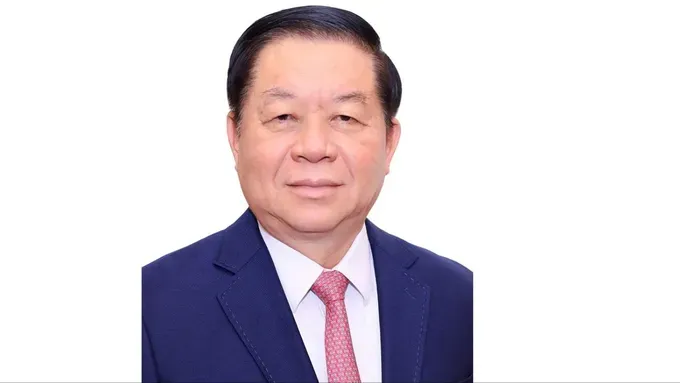
Sharp, pioneering force on ideological front
Reflecting on the 100-year journey of the Vietnamese Revolutionary Press on its anniversary on June 21, Head Nguyen Trong Nghia of the Central Propaganda and Mass Mobilization Commission restated the press’s foundational elements, namely its revolutionary character, its popular character, its Party character, and its combat character.
These have all been identified very early by President Ho Chi Minh when he established Thanh Nien Newspaper – the nation’s first revolutionary publication on June 21, 1925.
For the past century, the Vietnamese Revolutionary Press has served as a sharp ideological weapon for the Party and people. In times of struggle, it acted as a rallying banner, uniting the nation with an ignited spirit of patriotism and freedom.
During the modern era of Doi Moi (Reform) and globalization, it has continued as a pioneering ideological force. The Vietnamese Revolutionary Press guides public opinion by championing the good, serves as a vital bridge between the State and its people, and provides critical social commentary, contributing to national unity.
Looking back, it can be affirmed that the identity of the Vietnamese Revolutionary Press lies in the dialectical unity between revolutionary ideology and methods; between the ideal of serving the Fatherland and the people, and unwavering political fortitude; between sharp topicality and profound humanity; and between a spirit of engagement and creativity, and a deep sense of political responsibility and professional ethics.
These very values have cultivated a press that is constantly growing its ranks, diversifying its forms, innovating its technology, and expanding its public reach – all while remaining firm in its orientation, steadfast in its principles, and preserving the people's unwavering trust in the Party and the regime.
In every historical stage of the revolution, especially during the two great resistance wars, the image of the battlefield reporter – with a backpack on their shoulders, a camera slung across their chest, a pen in one hand and a rifle in the other, traversing forests and streams, living alongside soldiers, and making the ultimate sacrifice in the trenches – is a moving symbol of the fusion of professional duty and revolutionary ideals, of patriotism and the call to combat.
Over 500 journalist-soldiers fell in battle and must forever be honored. These skilled professionals from numerous press agencies were the ultimate embodiment of a press that “lived with the people and fought with the nation”.
Their sacrifice brings to life President Ho Chi Minh’s teaching that journalists are revolutionary soldiers whose pens are sharp weapons. This principle affirms their noble role in the nation’s cause of liberation, construction, and defense, solidifying their integrity and historical contribution to the country.
Answering the question about the transformation of the press in peacetime to continue its glorious history, Mr. Nguyen Trong Nghia said that the press at present, especially after 40 years of Doi Moi, must affirm its mission to “serve the Fatherland and people”, by being the bridge between the Party, the State and citizens.
It must precisely disseminate policies and guidelines while becoming a vital channel for receiving and reflecting public sentiment and aspirations, thereby consolidating trust and strengthening social consensus.
The press performs its role of constructive social criticism by identifying issues, promoting reform, and enhancing state effectiveness for the national interest. It is also a crucial force in building an advanced Vietnamese culture imbued with national identity, fostering humanistic values, and inspiring aspirations for a prosperous nation.
More importantly, the press acts as a “sharp weapon” against hostile forces. It protects the Party’s ideological foundation by refuting false viewpoints, combating toxic online information, and promoting the values of truth, goodness, and beauty, and thus reinforcing faith in the nation’s chosen socialist path.
It can be affirmed that in peacetime, the press has not stepped back but has transformed its mission with soberness, fortitude, and a profound sense of responsibility. It continues to be a strong force on the ideological front, a companion to the people, a voice for justice and progress, and a partner in the nation’s development.
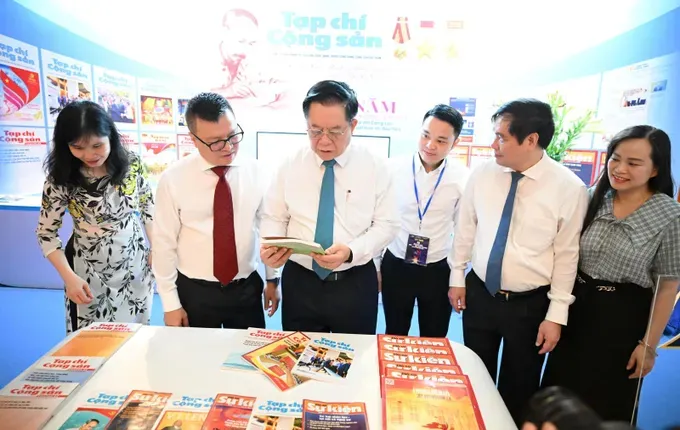
Promoting role of key press agencies
In the revolutionary time of national restructuring for effective performance, governing bodies and state management agencies have paid much attention and offered strong support to the press so it can maintain its position as a force that constructs information, guides society, accompanies reform, and inspires the aspiration for development.
State management agencies for the press must embody the role of environmental architects, institutional supporters, and partners in the transformation of press agencies.
To begin with, a modern, development-oriented approach to press management is needed, moving beyond rigid bureaucracy. This requires the finalization of the amended Press Law to create a transparent legal framework for the press to flourish.
In addition, press agencies must be restructured to be streamlined and effective – a process involving deep innovation in content, finance, and digital capacity, not just consolidation. Governing bodies must evolve from merely managing to proactively co-developing with their affiliates, providing strategic partnership.
Finally, journalists must adapt their mindset from simple information transmission to “value creation”. They must shift from one-way reporting to multi-platform engagement, serving the community and nation righteously to foster development.
Very important tasks of the press
Mentioning the solemn, comprehensive, and strategic duties of the revolutionary press at the moment, Mr. Nguyen Trong Nghia shared that it must first act as the core ideological force, driving propaganda for Party congresses to build unity and trust. It must also effectively disseminate key Central Committee resolutions on national development, creating a powerful impetus to achieve the 2045 high-income vision.
Second, the press must maintain its position as the official, standard-setting, and trustworthy source of information, playing a role in guiding public opinion and leading social consciousness amidst a multi-dimensional and turbulent information environment where truth and falsehood are often blurred. This is a special political responsibility, representing both a challenge and an opportunity for the press to affirm its fortitude and core values.
Third, the press must continue to be a bridge between the Party and the people, effectively exercising its function of responsible social criticism to help refine policies, combat negativity and corruption, and fortify public trust and social consensus.
Fourth, the press must effectively participate in Party building, cultural development, and nurturing the Vietnamese people of the new era. Every press agency and every journalist must spread positive values, inspire action, and awaken the aspiration for a prosperous and happy nation.
Fifth, the press must proactively innovate its thinking, undergo a robust digital transformation, modernize its operations, enhance its governance capacity, and adapt to the multi-platform, multi-speed media environment, all while upholding professional ethics and unwavering political fortitude.
The identity of the Vietnamese Revolutionary Press is the dialectical unity between revolutionary ideology and revolutionary methods; between the ideal of serving the Fatherland – serving the people and a firm political bravery; between sharp topicality and profound humanity; between the spirit of engagement and creativity with political responsibility and professional ethics. It is these values that have created a press that is constantly growing in its workforce, developing in its forms, innovating in its technology, expanding in its public access space – but still firm in its orientation, steadfast in its stance, and maintaining the people’s trust in the Party, with the regime.
Nguyen Trong Nghia, Head of the Central Propaganda and Mass Mobilization Commission
Highly aware of the challenges encountered by the press in digital transformation and fierce information competitions, Head Nguyen Trong Nghia proposed various solutions.
To overcome economic challenges, the press must remain steadfast in its principles while being flexible in its operations. This involves enhancing content quality, segmenting audiences, and promoting modern forms like data and multi-platform journalism to meet public demand.
The State must strengthen its commissioning mechanism for press products, treating it as a strategic investment to ensure a healthy media ecosystem, not just operational support.
Concurrently, agencies must develop legal and transparent revenue streams, remembering that economics is only a means to fulfill their core mission of serving the nation. Enhanced cooperation and resource sharing among agencies are also vital to avoid duplication and focus on creating distinctive, high-impact products.
It must be emphasized that the press is not alone. The Party and State will always stand with and create conditions for journalism to develop correctly, overcome modern challenges, and contribute to the nation’s ascent into a new era.
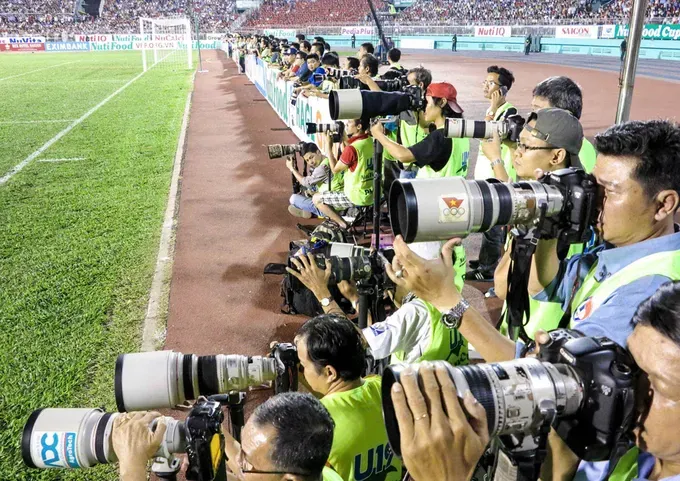
On the 100th anniversary of the Vietnamese Revolutionary Press, Head Nguyen Trong Nghia shared his expectations and profound gratitude to the nation’s journalists.
A full century has passed since Thanh Nien Newspaper was founded by the great leader Nguyen Ai Quoc. In that time, the Vietnamese Revolutionary Press has clearly affirmed its position as a shock force on the ideological and cultural front, a companion to the Party, and an entity with blood-and-flesh ties to the people, constantly growing and developing.
He hopes that journalists will always keep the revolutionary flame alive in their thoughts and actions; continue the glorious traditions of Vietnam; safeguard their political fortitude, professional ethics, and spirit of engagement; and constantly innovate to meet the ever-higher demands of the country and the people.
He expects the press to remain a reliable guide for the people and a pioneering force protecting the Party’s ideological foundation and nurturing national development. In this digital age, all journalists must elevate their intellect and master technology, not just to “march with the times” but to lead them, inspiring societal trust and contribution.
This 100-year milestone is the starting point for a new journey. Based on its glorious tradition and the relentless efforts of today’s journalists, he has complete faith that the press will continue to guide the country into a prosperous future.

